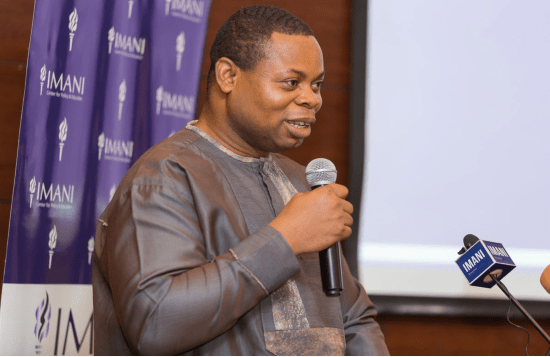Franklin Cudjoe, President of IMANI Africa, has suggested that rather than abolishing the E-Levy, Ghana should reimagine it as a vehicle for financial empowerment by turning it into a National Savings Scheme.
Cudjoe argued that repurposing the E-Levy into a National Savings Scheme would not only provide financial security for millions of Ghanaians but also address the country’s chronic low pension coverage.
Meanwhile, the Electronic Levy (E-Levy) has been one of Ghana’s most controversial fiscal policies, sparking public outcry and widespread opposition since its introduction.
Arguing in favor of retaining the E-Levy, Cudjoe acknowledged that the National Democratic Congress (NDC) has outlined bold economic recovery plans, particularly its 24-hour economy program.
However, he emphasized that the primary challenge to this vision lies in securing the required funding without destabilizing the IMF framework scheduled for 2025 to 2028.
“Historically, Ghana has leaned heavily on fiscal and monetary policies to spur economic growth or curb inflation. However, due to the country’s structural vulnerabilities, inflation has persistently taken center stage, overshadowing growth.
“This approach has resulted in an overburdened citizens and corporate sector plagued by high taxes, elevated interest rates, and suppressed earnings.”
Franklin Cudjoe

He further argued that the country’s domestic financial market remains too small to sustain both government budgets and private-sector financing, forcing successive administrations to rely on international borrowing.
This, in turn, has heightened financial vulnerabilities, destabilizing public finances, and leaving Ghana heavily indebted.
Cudjoe also highlighted that Ghana’s pension coverage is alarmingly low, with only two million out of a 13-million-strong labor force contributing to pension schemes.
In contrast, pension assets in other African countries like Botswana ($9 billion), Kenya ($12.8 billion), Nigeria ($28 billion), and South Africa ($213 billion) far outstrip Ghana’s $4.3 billion.“Ghana’s domestic financial market is too small to meet the dual demands of government budgets and private-sector financing.”
The lack of pension fund coverage has prevented Ghana from leveraging these assets for long-term economic growth, a strategy effectively used by high-income countries.
The Need to Introduce Fourth Tier Pension Scheme
Moreover, Franklin Cudjoe’s proposal aims to turn the E-Levy into a Ghana Universal Pension (GUP) scheme, ensuring broader financial security for citizens.
The initiative, referred to as the Fourth-Tier Pension Scheme, seeks to repurpose E-Levy revenues into an inclusive pension framework.

He noted that under this system, all working Ghanaians—especially informal sector workers—would gain access to structured pension savings, providing a reliable safety net in retirement.
The proposed pension scheme would include a Retirement Sub-account, funded directly by E-Levy contributions and locked for a minimum of ten years.
“The Savings Sub-account will accept voluntary contributions from members or third parties (family and friends) and will have a minimum investment period of five years, except for those over 55.”
Franklin Cudjoe
Withdrawals, he noted, would be accessible via mobile apps or USSD platforms, streamlining access to funds and fostering a culture of financial inclusion.
Cudjoe argued that leveraging household savings through a universal pension scheme would not only alleviate the financial burden on retirees but also create a massive pool of capital for national development.
Ghana currently faces a looming retirement crisis, with an aging population, a growing informal sector, and a failing social security system.
As such, he stressed that without intervention, many Ghanaians will retire into poverty, relying on a weakening extended family support system. “It is time to secure the future of Ghanaians by fostering a national savings culture through a universal auto pension system.”
Investment Strategy and Economic Impact
Furthermore, Franklin Cudjoe pointed out that one of the major shortcomings of Ghana’s pension system is its overreliance on government securities, with 89% of pension funds invested in treasuries in 2021.
He noted that comparatively, the UK, US, and Netherlands allocate just 41%, 18%, and 43%, respectively, to government bonds, instead investing in diversified assets like corporate bonds and equities.

Accordingly, he advised that Ghana must adopt a more balanced investment approach, ensuring pension assets generate sustainable long-term returns rather than being eroded by inflation and mismanagement.
The proposed pension scheme would adhere to the National Pensions Regulatory Authority’s (NPRA) guidelines, allowing investments in corporate bonds, equities, fixed deposits, and real estate.
By channeling pension funds into commercially viable projects—such as cocoa purchases, agro-processing, and infrastructure—the GUP could drive economic growth while reducing reliance on expensive external borrowing.
“The economic impact of this proposal cannot be overstated. With projected annual contributions (from E-levy revenue) exceeding GHS 2.4 billion (for 2025), Ghana stands to accumulate over GHS 170 billion in pension assets (national savings) in 15 years from the e-levy contributions alone.”
Franklin Cudjoe
Cudjoe indicated that with additional voluntary contributions, this figure could reach GHS 520 billion, marking an unprecedented capital accumulation in Ghana’s history.
Such a vast reserve of domestic capital would provide liquidity for critical economic activities, from stabilizing sovereign debt to financing key sectors of the economy.
Governance and Public Trust
For the scheme to succeed, robust management and transparency measures must be implemented.
Accordingly, Franklin Cudjoe envisioned a joint venture model involving both government and private-sector stakeholders, ensuring efficient administration and accountability.
He indicated that digital platforms would allow contributors to track their savings in real time, fostering trust and encouraging participation.

The scheme would be overseen by an independent board, including government officials, labor representatives, and private-sector experts, ensuring fairness and efficiency.
Meanwhile, public skepticism over state-managed funds remains a significant hurdle.
To mitigate these concerns, Cudjoe advocated for involving established pension managers with proven expertise in both local and international markets.
He believes that entrusting the scheme to experienced professionals would ensure prudent asset allocation and long-term financial stability.
“This policy represents a visionary shift in how national revenues are utilized—transforming what was once a divisive tax into a catalyst for national savings mobilization.”
Franklin Cudjoe
The initiative is more than just a financial policy; it is a social contract that promises a dignified retirement for all Ghanaians while building a resilient, self-sufficient economy.
Ghana stands at an economic crossroads. The country’s reliance on external borrowing and unsustainable debt accumulation has left its financial future hanging in the balance.
Repurposing the E-Levy into a national pension scheme offers a practical, long-term solution that secures both individual financial futures and national economic stability.
By transforming what was once seen as an unpopular tax into a vehicle for prosperity, Ghana can pave the way for a more resilient economy—one that benefits all citizens, not just a privileged few.
READ ALSO: G20 Foreign Ministers’ Meeting: South Africa’s Bold Stand







